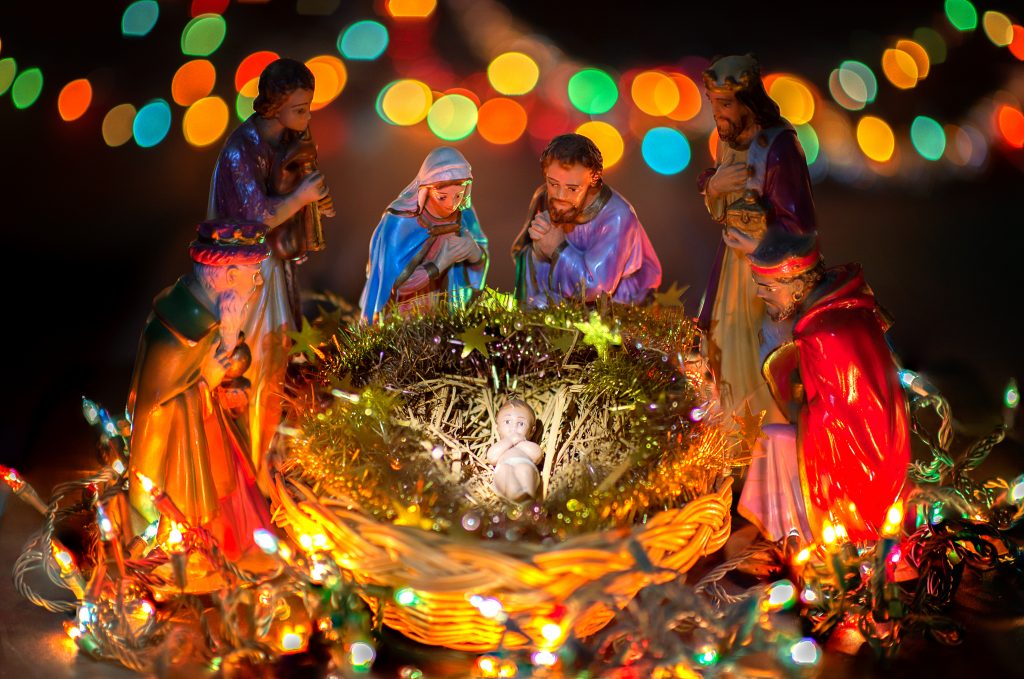Every year when Thanksgiving weekend draws to a close and my neighbors’ lawns start to erupt in inflatable Santas and nodding reindeer, my heart starts to long not so much for Christmas but for Navidad.
American Christmas and its oversize protagonist Santa Claus came into my life when I was 11, at a time when I was really too old to come to love him. I understand his irresistible appeal to children, with his big-belly laugh and his toy-laden sleigh. I like the gentle reindeer and the hilarious image of the roly-poly man stuffing himself down a narrow chimney.
But waiting for the Santa of Christmas is nothing like waiting for el Niño Jesus and los Reyes Magos of Latino Navidad. And it seems to me that spending Advent preparing for the oversize, toy-strewing Santa may be not only silly and trivial, but exactly the wrong way to spend the season.
During my childhood, my parents followed the pretty tradition of giving gifts to their children through the intercession of the Three Kings. We celebrated Navidad on its Eve, which we call Noche Buena (the Good Night) in happy reunion with friends and family.
At midnight we welcomed the newborn King properly, at the holy sacrifice of the Mass. That Mass with its strange, hushed, midnight feeling was splendid!
On Christmas Day we rested and looked forward to the Epiphany. For on that day the magi from the Orient, men who had been keenly attentive and obedient to the call of the transcendent, brought royal gifts in homage to the boy king. And in our house, they brought us two or three little toys we found, to our delight, under our beds.
Meanwhile, in the homes around us in Guadalajara, Mexico, children instead woke up Christmas morning and received gifts, like their American counterparts (although not in American profusion).
But the Mexican children’s toys didn’t come from a man who exists only in the imagination and only to deliver baubles — a man who never mentions or acknowledges God, though he times the toy delivery to coincide with his birth.
El Niño Jesus — God himself — was the Mexican gift-giver. So the humble one, the mangered one, the one with absolutely nothing, even a roof over his head, would make a stop on his vastly important and difficult journey to save fallen humanity to bring other poor children a little happiness.

Mexican children knew, and I knew, living among them, that Jesus’ coming to the world was pure self-gift, in every sense.
Santa Claus was a shock to me when I came to live in the United States. I saw him as a kind of dark magnet, drawing all eyes and attention away from the protagonists of that Good Night, and from the very needful soul-business of Advent.
I remember looking for the Holy Family in the seasonal cartoons, certain that the cold stable, patient donkey, and resounding Hallelujahs were in the North Pole somewhere.
But I searched in vain for the familiar elements.
Instead of the quiet joy of the gentle woman smiling sweetly at her babe (even though she knew that one day her heart would break to look at him), Santa displayed a chortling, superficial gaiety.
Instead of receiving a gift from the hands of men who crossed deserts to fall at the feet of a King with no royal trappings or prerogatives, toys came from work-mad elves. And instead of the example of self-forgetting humility from a God who disdained worldly wealth, I lived the Santa-induced frenzy of giving and getting things bought to fulfill an obligation, unwrapped and tossed aside by people sick to death of acquisition.
The difference between Christ-focused Navidad and Santa-focused Christmas is profound. And I learned that so is the difference in their corresponding Advents. If we are preparing for Santa, we drive to the shops, harried by the pressure of buying for people whose closets are bursting.
But preparing for the birth of the boy Jesus? That drives us to our knees. Because he is coming to demand his rightful place in our lives: the very center. And that center is usually occupied by cares and preoccupations that must be put aside to receive him properly.
Our wealth, power, pleasure, and all the effort we make to maintain and increase them have to fall away before the one who comes first, a process that takes prayer and hard work. Even very good things like the love we have for our families has to take its place behind Love himself, because only then will we know how to love them properly.
We try to do Navidad and its Advent a little better each year in our family. We like to think that we are emptying ourselves for Jesus, not our shelves for Santa. The giving and getting of things is kept to a polite minimum, and we focus our attention on the baby who comes to make a revolution in our lives.
If we succeed, we’ll know because the gifts we get, and give, will be abiding ones, and of immense worth — the kind of presents Santa Claus knows nothing of.
Dr. Grazie Pozo Christie grew up in Guadalajara, Mexico, coming to the U.S. at the age of 11. She has written for USA Today, National Review, Washington Post and the New York Times, and has appeared on CNN, Telemundo, Fox News and EWTN. Her Angelus column, “With Grace,” earned a Catholic Press Association award for “Best Regular Column: Family Life” in 2018. She practices radiology in Miami, Florida, where she lives with her husband and five children.
SPECIAL OFFER! 44 issues of Angelus for just $9.95! Get the finest in Catholic journalism with first-rate analysis of the events and trends shaping the Church and the world, plus the practical advice from the world’s best spiritual writers on prayer and Catholic living, along with great features about Catholic life in Los Angeles. Subscribe now!

